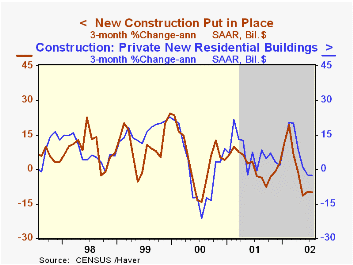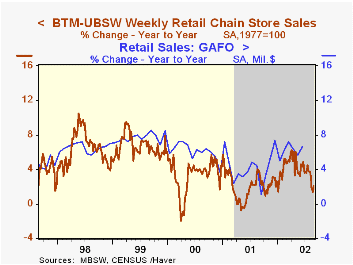 Global| Sep 04 2002
Global| Sep 04 2002Construction Spending Unchanged in July
by:Tom Moeller
|in:Economy in Brief
Summary
The value of construction put in place was about as expected in July, unchanged from June which was revised up. The revision to June was slight and due to a lessened decline in nonresidential construction. May's sharp decline was [...]

The value of construction put in place was about as expected in July, unchanged from June which was revised up. The revision to June was slight and due to a lessened decline in nonresidential construction. May's sharp decline was halved due to sharply higher residential figures.
Residential building fell for the third month in four. Single family building rose during the period but multi-family has fallen in five of the last seven months.
Nonresidential building activity again fell sharply and was down 12.1% YTD. Industrial and office building fell sharply, the seventh down month this year (-32.6% YTD).
Spending by governments rose slightly due to broad based increases amongst categories.
| Construction Put-in-place | July | June | Y/Y | 2001 | 2000 | 1999 |
|---|---|---|---|---|---|---|
| Total | 0.0% | -1.7% | -1.1% | 2.5% | 7.3% | 8.7% |
| Residential | -0.7% | -0.7% | 5.9% | 3.3% | 7.4% | 11.2% |
| Nonresidential | -2.2% | -2.9% | -20.2% | -3.1% | 7.1% | 1.9% |
| Public | 0.9% | -3.7% | 3.2% | 7.4% | 5.4% | 10.6% |
by Tom Moeller September 4, 2002

Chain store sales rose for the first week in four according to the BTM-UBSW survey. Sales rose 0.5% in the final week of August following declines ranging from 0.3% to 0.8% in the three prior weeks.
Sales for the full month of August fell 0.9% versus the average for July which rose only 0.3% from June.
During the last five years there has been a 61% correlation between the year-to-year percent change in monthly chain store sales and the change in GAF retail sales.
| BTM-UBSW (SA, 1977=100) | 8/31/02 | 8/24/02 | Y/Y | 2001 | 2000 | 1999 |
|---|---|---|---|---|---|---|
| Total Weekly Retail Chain Store Sales | 410.7 | 408.7 | 2.1% | 2.1% | 3.4% | 6.7% |
Tom Moeller
AuthorMore in Author Profile »Prior to joining Haver Analytics in 2000, Mr. Moeller worked as the Economist at Chancellor Capital Management from 1985 to 1999. There, he developed comprehensive economic forecasts and interpreted economic data for equity and fixed income portfolio managers. Also at Chancellor, Mr. Moeller worked as an equity analyst and was responsible for researching and rating companies in the economically sensitive automobile and housing industries for investment in Chancellor’s equity portfolio. Prior to joining Chancellor, Mr. Moeller was an Economist at Citibank from 1979 to 1984. He also analyzed pricing behavior in the metals industry for the Council on Wage and Price Stability in Washington, D.C. In 1999, Mr. Moeller received the award for most accurate forecast from the Forecasters' Club of New York. From 1990 to 1992 he was President of the New York Association for Business Economists. Mr. Moeller earned an M.B.A. in Finance from Fordham University, where he graduated in 1987. He holds a Bachelor of Arts in Economics from George Washington University.
More Economy in Brief
 Global| Feb 05 2026
Global| Feb 05 2026Charts of the Week: Balanced Policy, Resilient Data and AI Narratives
by:Andrew Cates






